The Australian Government is now in caretaker period. During this time, updates on this website will be published in accordance with the Guidance on Caretaker Conventions, until after the election.
Latest news and stories
NHMRC Media

NHMRC update on the Australian Drinking Water Guidelines
The National Health and Medical Research Council (NHMRC) plays a pivotal role in safeguarding public health by developing the Australian Drinking Water Guidelines (the Guidelines). These guidelines serve as a crucial resource for water regulators and suppliers, offering comprehensive advice on monitoring and managing drinking water quality across Australia.
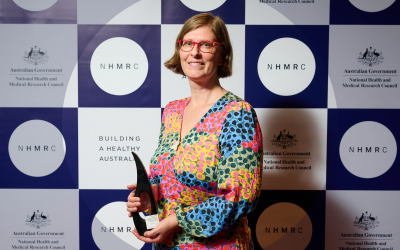
Research Excellence: Driving the transition to high value testing to benefit the health of all
Professor Katy Bell is a clinical epidemiologist and health services researcher at the Sydney School of Public Health. Professor Bell’s research evaluates the clinical effectiveness of healthcare, with a focus on medical tests used for screening, diagnosis and monitoring chronic disease. She is an NHMRC Fellow, and a member of the Medical Services Advisory Committee Evaluation Sub-Committee which critically assesses the evidence supporting applications for new listings on the Medical Benefits Scheme. The quality and impact of Professor Bell’s work has been recognised by awards including a Robinson Fellowship through the University of Sydney (2023) and an Australasian Epidemiological Association Mid-Career Researcher Professional Development Prize (2022).
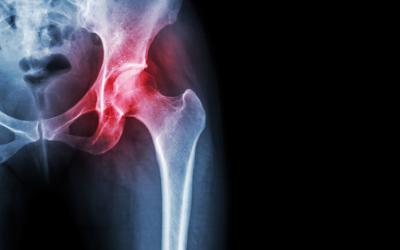
Australian innovators create superior surgical screws for orthopaedic surgeries
Not all orthopaedic implants are created equal. Surgeons repair bone fractures using metal plates and screws but sometimes the screws loosen and the surgery needs to be repeated. Previous expandable screws increased screw fixation strength but were more difficult (or impossible) to remove and increased surgery time.
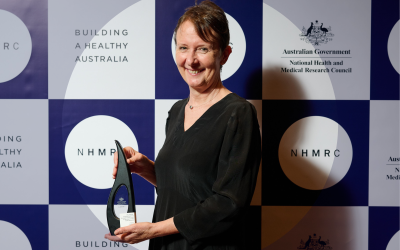
Research Excellence: Strengthening the evidence base for suicide prevention
Professor Jane Pirkis is the Director of the Centre for Mental Health and Community Wellbeing at the University of Melbourne. With a background in public health, Professor Pirkis has worked in the area of suicide prevention for over 25 years, contributing to knowledge about which interventions are effective in preventing suicide. Professor Pirkis’s work has also emphasised media-based interventions and interventions that involve restricting access to means of suicide. Professor Pirkis is the recipient of The University of Melbourne’s Marles Medal (2021) and is also the recipient of a Distinguished Alumni Award at the University of Tasmania (2017) and has received a Lifetime Research LIFE Award through Suicide Prevention Australia (2010).

Speaking of Science: Unlocking the power of Indigenous co-design and intervention: Transformative outcomes through authentic collaboration
National Reconciliation Week is a time for all Australians to learn about our shared histories, cultures, and achievements, and to explore how each of us can join the national efforts towards achieving national reconciliation.
In this Speaking of Science webinar held during National Reconciliation Week (27 May – 3 June 2024), we were joined by distinguished researcher and Indigenous leader, Professor Maree Toombs (Professor of Aboriginal and Torres Strait Islander Health in the University of New South Wales School of Population Health) who walked us through an incredibly moving presentation.
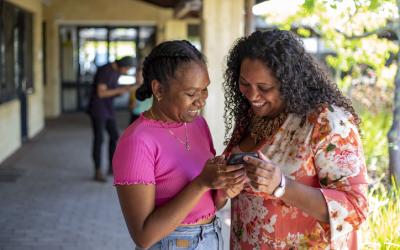
Redefining resilience research for Aboriginal and Torres Strait Islander adolescents
It is well known that Aboriginal and Torres Strait Islander peoples’ conceptions of health and wellbeing and life experiences differ vastly from mainstream populations.
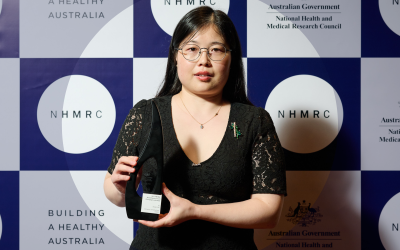
Research Excellence: Pioneering Early Cancer Detection through Nanotechnology
Dr Jiayan Liao is a dedicated researcher specialising in the field of nanotechnology, nanomedicine, biomedical engineering, and their applications in medical diagnostics. Dr Liao’s research focuses on developing innovative diagnostic tools for early cancer detection, leveraging photonics, fluorescent nanoprobes, and artificial intelligence for precise detection of single-molecule biomarkers in diseases and cancers. Dr Liao is contributing to the advancement of diagnostic methodologies and technologies, aiming for non-invasive, early detection methods to improve patient outcomes.

Budget 2024–25
The Budget 2024–25, delivered on 14 May 2024, confirms the Australian Government’s ongoing commitment to supporting health and medical research and its translation into new health treatments and technologies to improve the health of the Australian community.

Research Excellence: Solving Australia's Hypertension Treatment Problem
Professor Alta Schutte, SHARP Professor and Principal Theme Lead of Cardiac, Vascular and Metabolic Medicine at the University of New South Wales and The George Institute for Global Health, focuses on implementing effective scalable interventions for global blood pressure control. Appointed Co-Chair of the National Hypertension Taskforce in 2022, she was recognised in 2023 as the Leading Researcher in Vascular Medicine by The Australian. Notably, she received the 2022 Harriet Dustan Award from the American Heart Association and the 2023 Peter Sleight Excellence award from the World Hypertension League. Her impactful work extends to improving cardiovascular health in Australia and beyond.

Over $77 million in funding to be shared in national clinical trials and cohort studies
High-quality national clinical trials and cohort studies aiming to improve the health and wellbeing of all Australians will receive over $77 million in funding under the National Health and Medical Research Council’s (NHMRC) Clinical Trials and Cohort Studies grant scheme.

Life-giving oils: low omega-3 fatty acid linked to early preterm birth and lower brain development
Preterm birth occurs in approximately 1 in 10 infants globally. It causes about three-quarters of near-birth deaths and more than half of newborn deaths.

A $411 million commitment for researchers to bring their discoveries to life
The National Health and Medical Research Council (NHMRC) continues to invest in our nation’s health and medical research sector, with over $411 million awarded to 229 outstanding researchers to investigate Australia’s greatest health challenges.
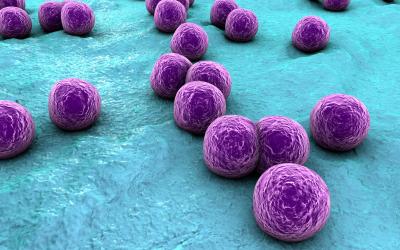
Uncovering the deep, dark secrets of pathogen genomes to save lives
Professor Ben Howden, from the University of Melbourne at the Doherty Institute, is a renowned clinician researcher whose dedicated focus on public health microbiology, genomics and antimicrobial resistance (AMR) has impacted thousands of lives.

Over $15 million for research collaborations to tackle healthcare policies and practice
With the announcement of 12 collaborative health and medical research projects today, Australian researchers are set to improve the translation and delivery of collaborative research outcomes into healthcare policy and practice.

A $5 million boost into furthering the quality and safety of telehealth
Six expert teams will share in over $5 million in funding to stimulate research into ensuring the quality and safety of telehealth, and its potential to achieve positive health outcomes under the National Health and Medical Research Council’s (NHMRC) Targeted Call for Research (TCR): Ensuring the quality and safety of telehealth 2023.

Research Excellence: Designing adaptive strategies to drive tuberculosis towards elimination
Dr Romain Ragonnet is a Senior Research Fellow in the Epidemiological Modelling Unit at Monash University. Dr Ragonnet specialises in the mathematical modelling of tuberculosis (TB) and COVID-19, and his notable contributions include the first-ever quantification of TB mortality and self-recovery rates. Dr Ragonnet has advised various governments of lower-middle-income countries in the Asia-Pacific region to assist the local control of TB and COVID-19. He also initiated and led multiple cross-disciplinary collaborations, creating a strong network of world-leading experts that spans mathematics, medical ethics, biostatistics, economics, and clinical trials.

Getting adolescents active for health benefits
Less than 10% of adolescents globally, including in Australia, do enough physical activity to align with the amount required for young people to be healthy.
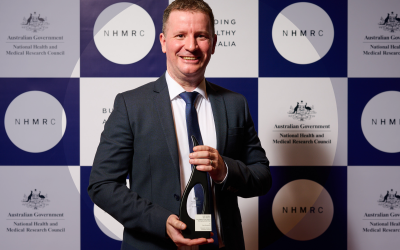
Research Excellence: Unlocking molecular vulnerabilities in childhood brain cancers
Dr Sean Humphrey leads the Functional Phosphoproteomics Laboratory at the Murdoch Children’s Research Institute. Dr Humphrey’s research uses cutting-edge mass spectrometers to create detailed molecular maps that capture how cells communicate and process information by regulating proteins. Dr Humphrey completed his PhD at the University of New South Wales before moving to Germany to undertake post-doctoral training at the Max Planck Institute of Biochemistry in Munich. Dr Humphrey’s research pinpoints key molecular signals that are dysregulated in human disease, uncovering a myriad of new targets for future therapies.

Addictive brain changes linked to obesity and simple supplement shows promise
When exposed to highly palatable (yummy) foods, some people overeat and have trouble regulating their intake long-term.
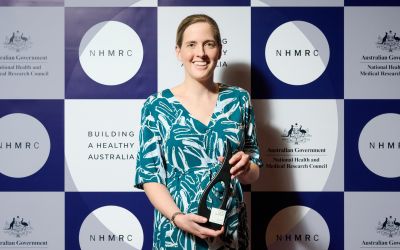
Research Excellence: Epidemiology and equity of kidney failure in Australasia
Dr Johanna Birrell is a general physician and advanced trainee in public health medicine. Dr Birrell has trained in both Australia and New Zealand and has a particular interest in rural health, Indigenous health, and health services research. Dr Birrell is completing her postdoctoral studies at the University of Sydney with concurrent clinical work. Her research explores geographic variation in kidney failure epidemiology and access to care across Australia and New Zealand. Dr Birrell has received awards including the Royal Australasian College of Physicians 2023 Aotearoa Trainee Research Award for Excellence in the Field of Adult Medicine and the Gerry Murphy Prize in 2022.

Honouring the achievements and dedication of Australian health and medical researchers
The National Health and Medical Research Council (NHMRC) has honoured the outstanding achievements with its annual Research Excellence Awards announced this evening in Canberra.

10 of the Best: Recognising Australia’s top researchers delivering extraordinary outcomes
The National Health and Medical Research Council (NHMRC) has released the 15th edition of its ‘10 of the Best’ publication, showcasing the calibre of our nation’s health and medical researchers working to prevent disease, improve detection and treatment methods, increase our understanding of common health conditions and deliver extraordinary outcomes.

$5 million towards Australian research to improve climate-related health outcomes
The National Health and Medical Research Council (NHMRC) has released Grant Opportunity Guidelines for a Targeted Call for Research (TCR) into 2024.

Speaking of Science: International Women’s Day 2024 - Inspire Inclusion
International Women’s Day represents a day of collective global activism and celebration that belongs to all of those committed to forging women’s equality.
In this Speaking of Science webinar held for International Women’s Day, we were joined by members of NHMRC’s Research Committee to discuss this year’s theme of ‘Inspire Inclusion’.

Speaking of Science: Ovarian Cancer Awareness Month- Early detection, risk prediction and improving prognosis
Around 1,786 new cases of ovarian cancer in Australia were estimated to have been diagnosed in 2023, which is the equivalent of a 1 in 87 lifetime risk.
In our first Speaking of Science webinar, held for Ovarian Cancer Awareness Month, we were joined by international expert in ovarian cancer research, Professor Susan Ramus (Professor of Molecular Oncology in the School of Clinical Medicine at the University of New South Wales).

NHMRC Update on the Australian Dietary Guidelines
The National Health and Medical Research Council (NHMRC) is currently undertaking a review of the Australian Dietary Guidelines. The updated guidelines are scheduled for delivery in 2026.

NHMRC Investigator Grants sets the standard for gender equity
It is an inspiring time for health and medical research in Australia as the National Health and Medical Research Council (NHMRC) sets the standard for achieving gender equity through its largest grant scheme, Investigator Grants.

Transcript: RN Breakfast interview with Professor Anne Kelso AO on gender equity in research funding
In the final days of Professor Anne Kelso’s term at NHMRC, we reflect on her contribution to the agency and the sector, including through initiatives to address gender disparities in health and medical research. Professor Kelso explained why such interventions are necessary during an interview with Patricia Karvelas on ABC Radio National Breakfast on November 15 2022.

Transcript: MJA Podcast interview with Professor Anne Kelso AO on her term as NHMRC CEO
In the final days of Professor Anne Kelso’s term at NHMRC, we are reflecting on changes that have taken place at the agency and in the wider sector while she has served as CEO. During an interview with Cate Swannell for the MJA Podcast on December 5 2022, Professor Kelso discussed some of the most significant experiences of her tenure, including the introduction of an initiative to address gender disparities in the Investigator Grant scheme.

Consultation on options to reach gender equity in the Investigator Grant scheme: Consultation closed
NHMRC's vision is a gender diverse and inclusive health and medical research workforce to take advantage of the full range of talent needed to build a healthy Australia.
NHMRC has completed its consultation on options to reach gender equity in the NHMRC Investigator Grant scheme.
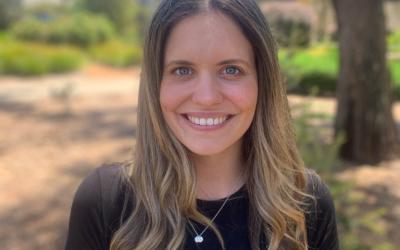
'I leave not only a more confident worker but also a more confident person.'
Emily McDonald’s journey to becoming an intern at NHMRC has not been exactly straightforward.

Australia’s investment in eradicating malaria
Over the last 10 years NHMRC has invested more than $191 million in research on malaria1

NHMRC Dementia Research News
The National Health and Medical Research Council (NHMRC) remains committed to supporting dementia research in Australia following the end of the Australian Government's Boosting Dementia Research Initiative (BDRI).

Healthcare key to bridging determinants of health
'Capacity development is something I’m really passionate about and there is definitely a need for it' - Dr Odette Pearson.
